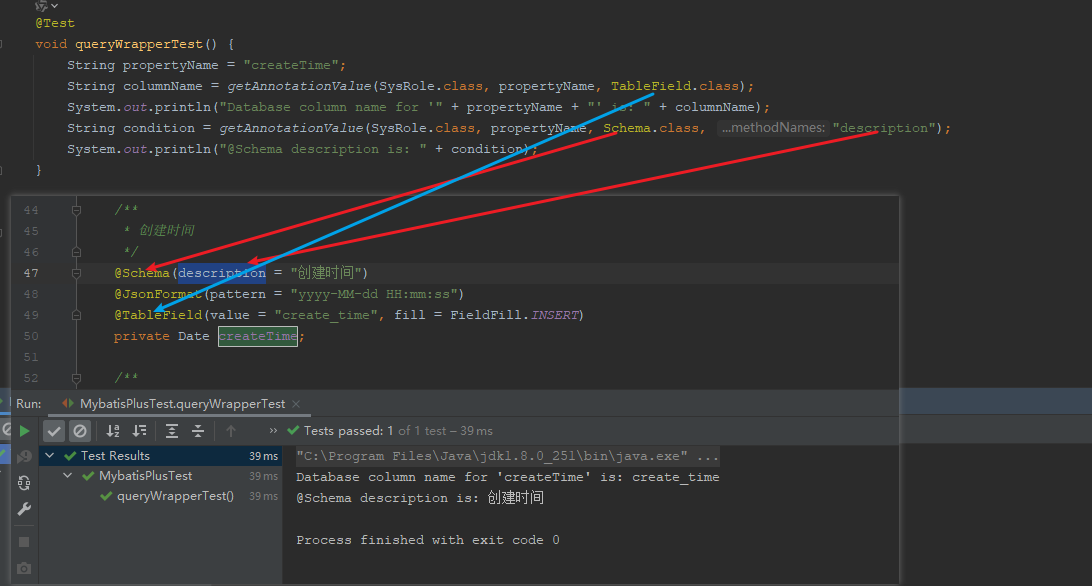根据字符串,获取实体属性上的annotation,如:createTime” 找到对应实体属性中的 TableField(value = "create_time", fill = FieldFill.INSERT)
根据字符串,获取实体属性上的annotation,如:createTime” 找到对应实体属性中的 TableField(value = "create_time", fill = FieldFill.INSERT)
- Field[] fields = clazz.getFields(); //仅能获取类(及其父类) public属性成员
- Field[] declaredFields = clazz.getDeclaredFields(); //仅能获取类本身的属性成员(包括私有、共有、保护)
- Field[] superDeclaredFields = clazz.getSuperclass().getDeclaredFields(); //因此在获取父类的私有属性时,要通过getSuperclass的之后再通过getDeclaredFiled获取。
BaseEntity.java
public class BaseEntity implements Serializable {
/**
* 创建时间
*/
@Schema(description = "创建时间")
@JsonFormat(pattern = "yyyy-MM-dd HH:mm:ss")
@TableField(value = "create_time", fill = FieldFill.INSERT)
private Date createTime;
public Date getCreateTime() {
return createTime;
}
public void setCreateTime(Date createTime) {
this.createTime = createTime;
}
}
SysRole.java
/**
* 角色
*/
@Schema(description = "角色信息")
@TableName("sys_role")
public class SysRole extends BaseEntity {
private static final long serialVersionUID = 1L;
/**
* 主健ID
*/
@Schema(description = "主健ID")
@TableId(value = "id", type = IdType.ASSIGN_UUID)
private String id;
/**
* 角色标识
*/
@Schema(description = "角色标识")
@TableField(value = "code")
private String code;
public String getId() {
return id;
}
public void setId(String id) {
this.id = id;
}
public String getCode() {
return code;
}
public void setCode(String code) {
this.code = code;
}
}
MybatisPlusTest
import com.baomidou.mybatisplus.annotation.TableField;
import com.cuwor.base.entity.SysRole;
import io.swagger.v3.oas.annotations.media.Schema;
import org.junit.jupiter.api.Test;
import java.lang.annotation.Annotation;
import java.lang.reflect.Field;
public class MybatisPlusTest {
@Test
void queryWrapperTest() {
String propertyName = "createTime";
String columnName = getAnnotationValue(SysRole.class, propertyName, TableField.class);
System.out.println("Database column name for '" + propertyName + "' is: " + columnName);
String condition = getAnnotationValue(SysRole.class, propertyName, Schema.class, "description");
System.out.println("@Schema description is: " + condition);
}
/**
* 根据字符串,找到对应属性,获取Annotation的值
*
* @param clazz 被查找对象
* @param propertyName 被查找属性
* @param annotationClass 注释类
* @param methodNames 注释类的方法
* @param <T>
* @return
*/
public static <T extends Annotation> String getAnnotationValue(Class<?> clazz, String propertyName, Class<T> annotationClass, String... methodNames) {
try {
// 首先检查当前类中的字段 -- 仅能获取类本身的属性成员(包括私有、共有、保护)
Field[] declaredFields = clazz.getDeclaredFields();
for (Field field : declaredFields) {
if (field.getName().equals(propertyName)) {
T annotation = field.getAnnotation(annotationClass);
if (annotation != null) {
// 这里假设注解有一个名为 "value" 的方法返回 String 类型
// 你需要根据实际的注解定义来调整
java.lang.reflect.Method valueMethod = annotationClass.getMethod(methodNames.length > 0 ? methodNames[0] : "value");
return (String) valueMethod.invoke(annotation);
}
}
}
// 如果没有在当前类中找到,就检查父类 -- 在获取父类的私有属性时,要通过getSuperclass的之后再通过getDeclaredFiled获取。
Class<?> superclass = clazz.getSuperclass();
while (superclass != null) {
Field[] superDeclaredFields = superclass.getDeclaredFields();
for (Field field : superDeclaredFields) {
if (field.getName().equals(propertyName)) {
T annotation = field.getAnnotation(annotationClass);
if (annotation != null) {
java.lang.reflect.Method valueMethod = annotationClass.getMethod(methodNames.length > 0 ? methodNames[0] : "value");
return (String) valueMethod.invoke(annotation);
}
}
}
superclass = superclass.getSuperclass(); // 递归搜索父类
}
} catch (Exception e) {
e.printStackTrace();
}
return null; // 如果没有找到对应的注解或属性,返回null
}
}

本文来自博客园,作者:VipSoft 转载请注明原文链接:https://www.cnblogs.com/vipsoft/p/18516203

 浙公网安备 33010602011771号
浙公网安备 33010602011771号